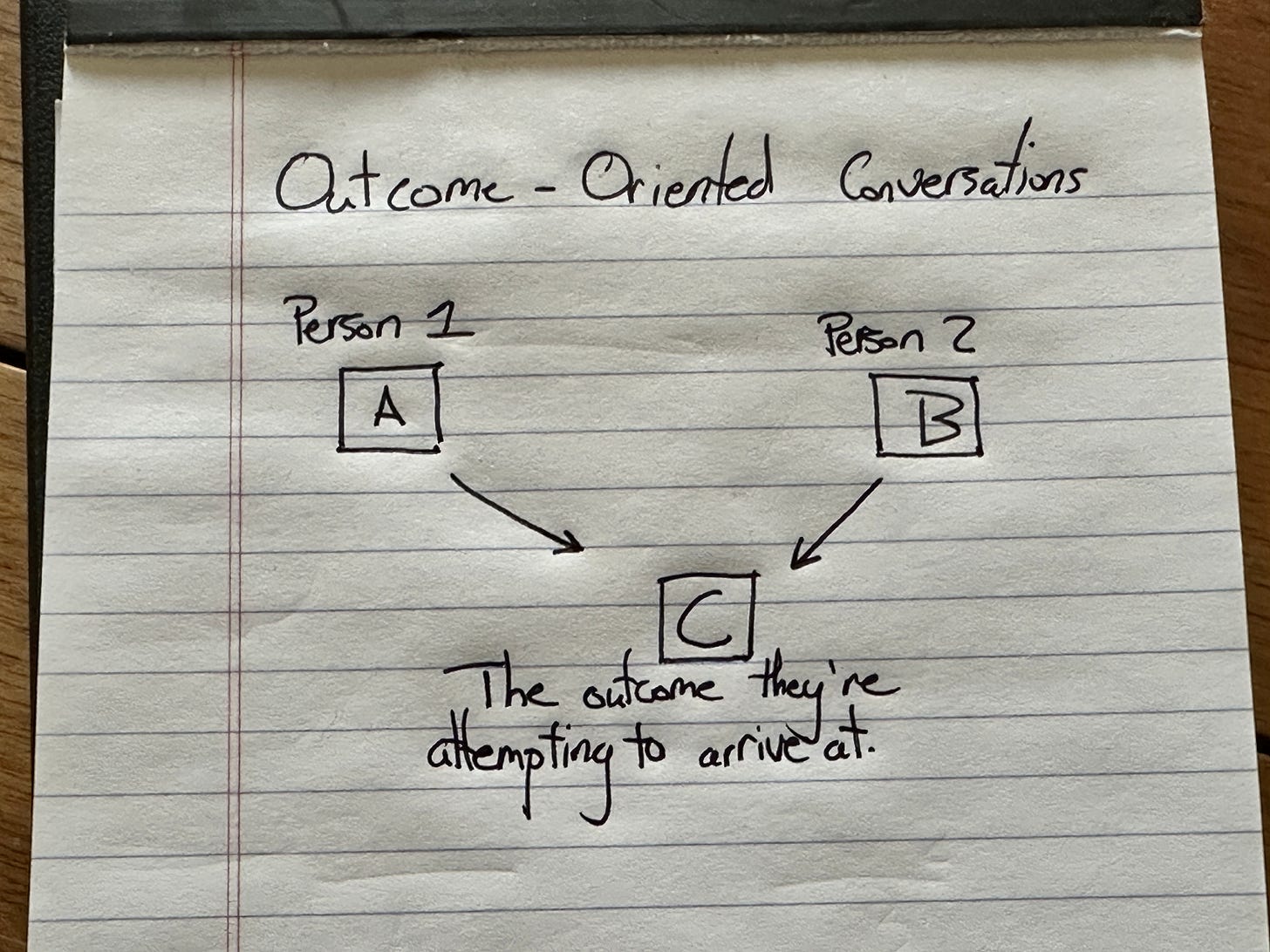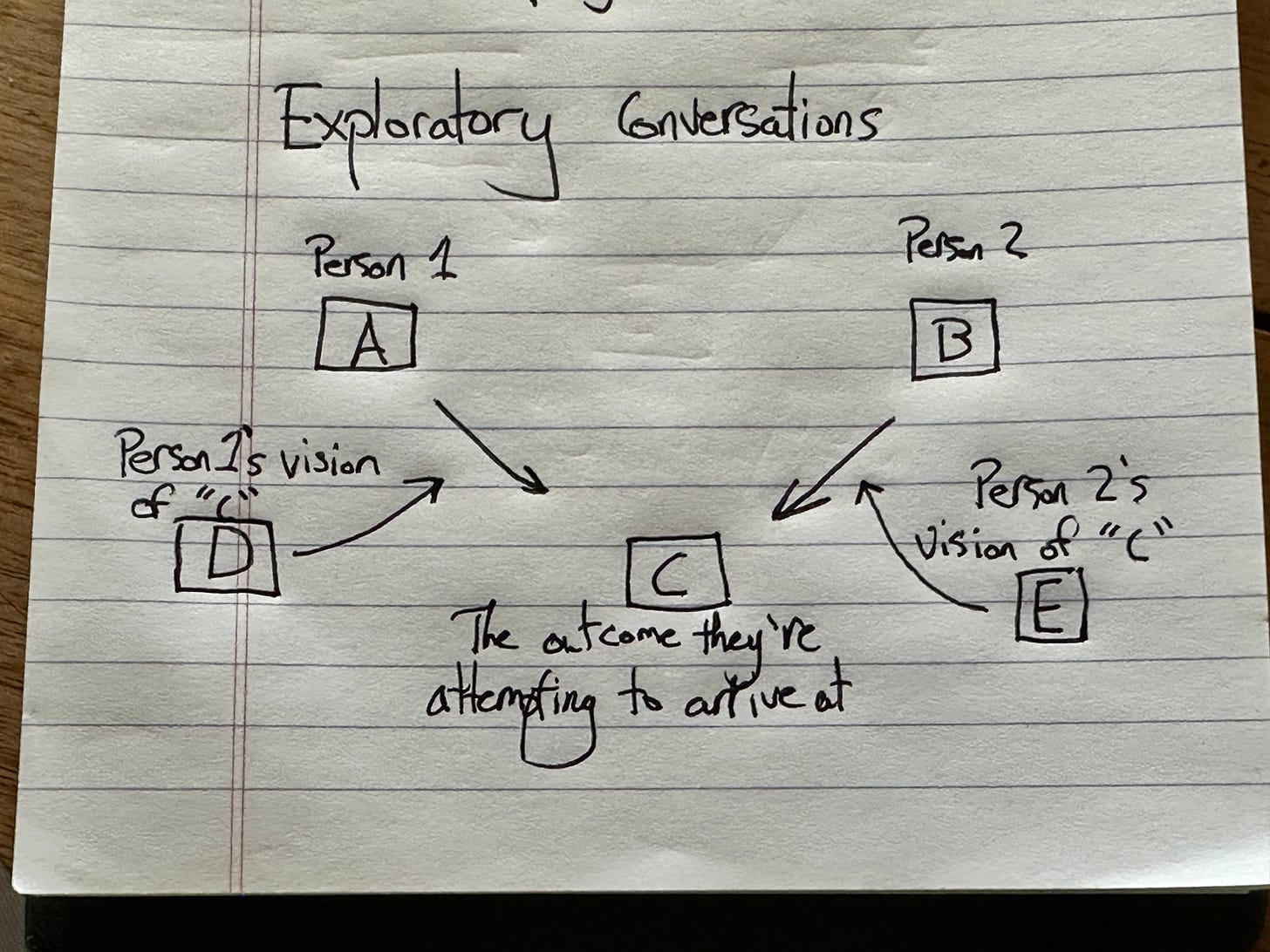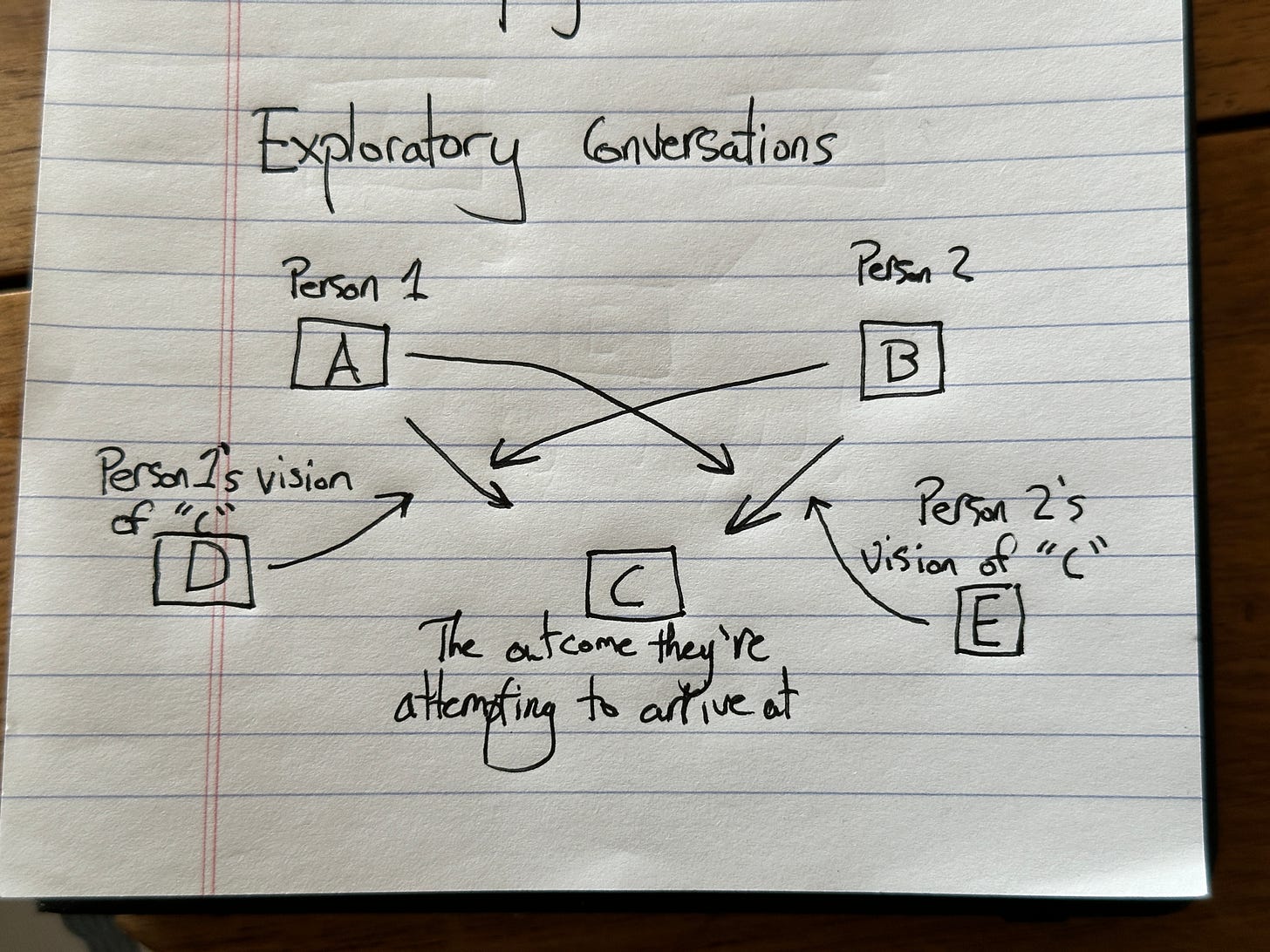How to have more interesting conversations
When I stopped assuming I understood what people mean, it changed how I talk with them.
Quick note: as you can probably tell, we’re in a period of experimentation here with this newsletter/blog. Due to popular demand, I’m bringing back the music recommendations at the bottom. If the cacophonous call for more recommendations continues, I’ll have to see about creating a monthly “inspiration” column with some of the things I’ve enjoyed watching, reading, learning about or listening to... but one thing at a time, I must first find a rhythm here that is sustainable. Upgrading to a paid subscription makes more of these things possible.
Conversation is how we communicate with one another and is an essential form of information exchange to function in society. Yet conversation is so much more than that – just like food is both necessary to survive but is also an experience, conversation can be either deeply unpleasant or deeply pleasurable. Why are some conversations painfully boring and others make it easy to stay awake until 4am?
I think I’ve identified the single most reliable way to shift out of boring conversation and into interesting conversation.
First, where things go wrong: conversation with the focus of attaining a certain outcome may be useful, but can quickly becoming limiting. A few examples of this:
A) I need you to understand what I mean.
B) I need you to see things the way I see them.
C) I need to convince you about something.
D) I need you to agree with me.
This might make sense in a situation of genuine urgency or danger, but what if you’re just having dinner with a friend on a Thursday evening?
With outcome-oriented conversations, A is attempting to get B to see “C” (their idea or view or perspective on something) and vice versa in the other direction.
When you need something from the other person, it limits the scope of conversation. Often we don’t even realize we’re doing this. I have to catch myself doing it. My little brother had to deal with quite a bit of this growing up… once I finally got it in my head that trying to change him/his view on something is a complete and utter waste of time, we began to get along a lot better. He’s a complex person with some overlap in interests but also a lot of views that vary wildly from mine and instead of that being a problem, it can just be what it is.
So if outcome-oriented conversations are limiting, what do conversations look like when you aren’t outcome-oriented? And how do you even do that?
I used to always think that to have a properly functional conversation, you must agree on definitions first. But that’s what you need to have an argument or a negotiation. You’re convincing someone of your perspective on something. Conversations don’t abide by the same rules. In fact, a pattern I’m noticing is that so many of my favorite conversations come about when I realize we don’t have the same concept of this thing we’re talking about. Not sharing the same definitions on stuff is interesting.
“D” refers to A’s vision of “C” and “E” refers to “B’s vision of “C”
What if instead of A & B focusing on “C”, A focused on “E” and B focused on “D”. This is exploratory conversation.
You can try this out the next time you speak with a friend. It’s really simple to do, all you have to ask is, “what do you mean when you say ________ ?” This is like a door into a whole new world: a world where you stop assuming you understand what people mean when they say things. And it turns out there is a tsunami of assumptions in basically all conversation.
Recently someone did this to me which I’m grateful for! I was describing myself as a “chaotic” person. They were unconvinced by this word choice, and after a line of questioning, I found myself providing unsatisfactory answers, even to myself. I was definitely trying to say something about myself, but I did not seem to have the words. I landed on a word that could mean so many different things….
They said something else that was interesting to me: “I struggle to see how you could be chaotic and yet write the way that you do.”
That was a surprising idea. I had formerly not seen any kind of link between those two things, they seemed entirely disconnected. But to this person I was speaking with, they were not. This is an assumption of their own, and another (potentially) fun rabbit hole to go down.
***
This is not meant to be a philosophical thought experiment on whether or not we can actually know what other people mean when they say things. I’d rather take this in a more practical direction: it’s quite fun and perspective expanding to stop assuming you understand what people mean. To question even the basic things.
When I hear someone use a word or phrase in a way I’d never think to use it, I jump at the chance and playfully ask them what they mean, and with that, we’re off to the races, because what ensues is what I find so fascinating about the human experience: two (or more) people attempting to understand each other.
This is probably the most reliable way I have found of having better conversations.
The reason the conversation about what it means to be “chaotic” was interesting and valuable to me is that I’m forced to question definitions I have about myself. We so easily land on broad labels that can be thinly veiled self-judgements. They are limiting. I am chaotic and therefore I cannot do x, y or z.
These are self-assessments, and if there’s one thing humans are terrible at, it is accurate self-assessment. At the end of the day, I really have no idea how people perceive me.
Giving up on the assumption that I understand how people perceive me or that I really understand what people mean when they say things unlocks a way more expansive way of viewing the world. It’s liberating.
***
I have to be honest and say that I used to think it was quite easy to share common language and ideas with others. Now, I’m not even sure it’s possible. It feels like an insurmountable gap to bridge.
I’m building my case that nobody really understands what anyone else means when they say anything. I know this is an uncommon view of things. At best, I believe we sort of vaguely point in the direction of things that are part of the human experience.
There are so many unbelievably rich experiences I’ve had in my life that I cannot possibly put into words or otherwise express in any other way. Could you ever fully understand what I’ve experienced? I don’t see how. And I’m sure you’ve had your version of the same thing, but since I’m not living your experience, I have no idea what it was like. Just because we’re using the same words doesn’t mean we mean the same things.
Surely you’ve come across this quote from Bernard Werber, which pretty much sums up this conundrum:
Between what I think, what I want to say, what I believe I say, what I say, what you want to hear, what you believe to hear, what you hear, what you want to understand, what you think you understand, what you understand...They are ten possibilities that we might have some problem communicating. But let's try anyway...
The end of that quote is key – trying isn’t the problem. In fact, it’s fun to try to understand someone, so long as you don’t expect to ever fully get there. Exploration vs. Convincing.
After a few awkward experiences early in my dating life, I began asking women more questions about what they were experiencing. It started becoming painfully obvious that I had a totally different vision of many things, informed by my experiences as a man. There are experiences that many or most or maybe even all women go through that I never will. I recently learned just how horrible period pains can be. Or at least, I have a theoretical understanding, I’ve never felt it, and never will as I go through my day to day life… can I ever have a full appreciation of what it’s like? I’ll let you decide.
The best I think I can do – in all situations – is continue to be curious, to keep asking questions, to listen, and to never expect I’ll ever fully understand.
***
Share this with a friend and then use this framework to explore the assumptions you have about things you previously thought you saw the same way. It just might create an interesting conversation.
Music Recommendations
I love this cover of this really great song.







Isn't it also fascinating how we attach labels to ourselves based on our experiences at certain points in our lives? These labels gradually become part of our identity; yet as time passes, we often forget what those labels truly meant to us or why we believed in them in the first place. We may have changed or transformed ourselves long ago, but forgotten to update our terms :) Since understanding others helps us understand ourselves better, this could be another reason to engage in more meaningful conversations with people.
I have to say, I was interested in the title of this essay AND skeptical of another man telling the world how to have better conversations. But, pleasantly surprised and appreciate the places you landed through this thought-scape. Staying curious is an excellent rule of thumb and I was intrigued with how you explored that thread. This last bit resonated as well, “In fact, it’s fun to try to understand someone, so long as you don’t expect to ever fully get there” - an intriguing perspective shift that makes more space for all of us to be humans growing and changing 👏🏼